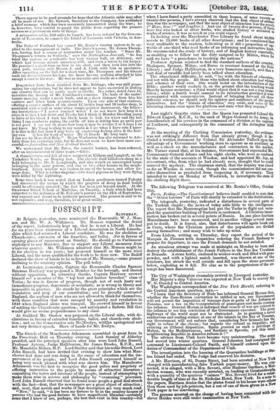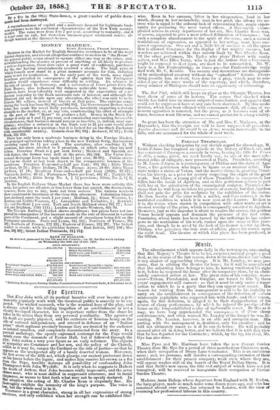POSTSCRIPT.
SATURDAY.
At Reigate, yesterday, were nominated the Honourable W. J. Mon- son and Mr. W. A. 'Wilkinson. Mr. Monson repeated the denial of the report, industriously kept up, that he is not a Liberal. He had for six years been chairman of a Liberal Association in North Lincoln- shire which had returned a Liberal candidate. He was for abolition of Church-rates, extension of the franchise, and ballot. Not in favour of opening places of amusement on Sunday. He should go to Parliament =pledged to any Ministry, free to support any Liberal measures from whatever quarter. Mr. Wilkinson admitted that Mr. Monson might be fit for election in ten years ; but proposed himself as the more tried liberal, and the more qualified for the work to be done now. The Bailiff declared the show of hands to be in favour of Mr. Monson,—some present inclining to the contrary opinion. The poll today.
At Leominster, yesterday, Captain the Honourable Charles Spencer Bateman Hanbury was proposed a Member for the borough, and elected without opposition. In returning thanks, Captain Hanbury avowed himself not a member of the " top boot and leather breeches" class of Tories; he was in favour of progress, though not of such hasty and immoderate progress, democratic or socialistic, as is wrong in theory and impossible in practice. He stands by the great principles which are the foundation and prop of our constitution; and he proudly contrasted England, the asylum of men who are not allowed to think for themselves, with those countries that were ravaged by anarchy and revolution in 1848 when England alone was tranquil. He avowed himself in favour of settling the Church-rate question ; and anticipated a Reform Bill that would give no undue preponderance to any class.
At Guilford Mr. Onslow was proposed on the Liberal side, with de- clarations in favour of extended franchise, ballot, and church-rate aboli- tion ; and on the Conservative side Mr.:Evelyn, with an apologetioal and rtot very distinct speech. Show of hands for Mr. Evelyn.
The friends of the Manchester Athenaeum assembled in great force in the Free-trade Hall on Thursday evening. Lord Stanley of .Alderley presided, and the principal speakers after him were Lord John Russell, Professor Aytoun, Judge Halliburton, Sir James Brooke, K.C.B., and Mr. Monckton Manes, M.P. Lord Stanley said that his noble friend, Lord John Russell, had been invited that evening to show him what Man- chester had done and was doing in the cause of education and the im- provement of its people ; and Lord John Russell expressed himself as being very much pleased with what was shown him. The Manchester Athenaeum was the first to recognize the good policy and propriety of offering instruction to the people by means of attractive literature ; consulting the tastes and interests of the people, instead -pf attempting to make them wise in science and philosophy by " cramming " processes. Lord John Russell observed that he found some people a good deal struck with the fact—first, that the newspapers are a great object of attraction; ;pd, next, that novels and works of that description arc very much read. "Now," he said, " it has been my fortune to be in the country-houses of persons who had the good fortune to have magnificent libraries—certainly some that I know of are, perhaps, the best that exist in this country—but when I have found a party assembled in those houses, of some twenty cc twenty-five persons, I have always observed that the first object of attrac- tion was the newspaper, and that the next object of attraction was the novel. (" Hear, hear." and laughter.) And out of twenty-five persons, if there were five who looked at other works, who studied history or attended to works of science, it was as much as you could expect." In looking over the Manchester Free Library he found about 40,000 novels to 23,000 books of all other descriptions ; and he considered that very creditable to the readers, indicating as it did a proportion of up- wards of one-third who read books of an informing and instructive kin-d, He recommended the study of history, and of English history especially, as enabling us to follow out the duty assigned us by Milton, when he said we have " a precedence in teaching the nations." Professor Aytoun rejoiced to find the standard authors of the country Shakspere, Spenser, Milton, and Burns in constant demand at the Free Library ; and Judge Halliburton, in a very humerous speech, said that a vast deal of twaddle had lately been talked about education. The educational difficulty,, he said, " lay with the friends of education and not with the people. All those who talked about education bad whimti and schemes of their own. One would insist on the introduction of the Bible ; another would exclude it, on the ground that the teaching weak thereby become sectarian; a third would object that it was not a tins lation ; while a fourth would consent to its introduction provided it were accompanied with commentaries. Instead of bringing forward all these different schemes, we should seek the opinion and assistance of the people themselves. Let the friends of education' step aside, and some of the labouring classes come upon the platform and state what they require."
Last night's Gazette states that the Queen has promoted Colonel Sir Edward Lugard, K.C.B., to the rank of Major-General in the Army, in Consideration of his services in the command of a division at the capture of Lucknow, and subsequently in the command of the Azimghur field force.
At the meeting of the Clothing Commission yesterday, the evidence was not strikingly different from that already given ; though it in- cluded a written statement by Colonel Sir Alexander Tulloch upon the advantage of a Government working store to operate as an auxiliary as well as a check on the manufacturers and contractors in the market. Mr. Turner stated that, at his instance, Government had superseded Mr. Commissary-General Adams and his eight clerks, who were so confused by the state of the accounts at Weedon, and had appointed Mr. Jay, in accountant, who, from what he had already seen, thought that he could unravel the mystery. The chairman stated, that the inquiry was closed so far as Weedon is concerned, though the commissioners did not con- sider themselves as precluded from reopening it, if necessary. They intended to meet on Monday at Woolwich, to investigate the state of the clothing deplit there.
The following Telegram was received at Mr. Renter's Office, October 21st.
Paris, Friday.—The Caustitutionnel believes itself enabled to state that the " Octroi barriers" of Paris will shortly be extended to the fortifications.
The telegraph, yesterday, indicated a disturbance in several parts of the Turkish empire ; the news of today adds little to the intelligence. Tho report that the Montenegrins had put the Turks to Sight and occu- pied the quarantine building of Surtoria is confirmed. A Christian insur- rection has broken out in several points of Bosnia. In one place fourteen Mussulmans have been massacred, and in another village several more put to death. It is feared, also, that disturbances will again break out in Crete, where the Christian portion of the population are divided among themselves ; and many wish to take up arms.
From Lisbon, writing on Thursday, they report the arrival of the Marquis de Piennes with despatches ordering the French Embassy to prepare for departure, in ease the French demands be not satisfied.
An atrocious attempt was made' at midnight on Monday to burn and destroy the establishment of the Jesuit Fathers in the Rue des Ursulines at Brussels. A stone bottle, enclosed in wicker-work and filled with gun- powder, and with a lighted match inserted, was thrown at one of the windows, but struck the wall outside and fell upon the stone pavement below, exploding as it fell. No clue as to the perpetrators of the ate tempt has been discovered.
The City of Washington steamship arrived in Liverpool yesterday. Her Majesty's ship Valorous was expected at New York to convey Sir W. G. Ouseley to Central America.
The Washington correspondent of the New York Herald, referring to the Central American question, says,— " I learn that the Secretary of State has informed General Herren that, whether the Cass-Herren convention be ratified or not, our Government will not permit the imposition of tonnage dues at ports of the Isthmus of Panama, nor a tax on the transportation of passengers-and mails crossing the isthmus. General Hen i an s informed that vessels of war are ordered to the isthmus to see this resolution of the Government executed. The great highways of the world must not be obstructed. As to granting_a naval rendezvous and coaling station at one of the islands in the Bay of Peon?, our Government will not enforce that, considering New Granada has the right to refuse if she choose ; but regards the refusal as impolitic) anti evincing an illiberal disposition, Spain granted us such a privilege Mahon, in the Mediterranean, and Sardinia at Spezzia, yet this small neighbouring Republic in America refuses it !" The advices from Utah have become very uninteresting. The army had moved into winter quarters. General Johnston had consigned the command to Lieutenant-Colonel Smith, and himself entered upon the duties of Commandant of the Department of Utah.
The investigation into the burning of the Quarantine buildings at Sta- ten Island had ended. The Judge had reserved his decision.
A Mr. Harrison, of 82, Duane Street, had been arrested at New Tor: charged with manufacturing false Turkish paper-money. He was con- nected, it is alleged, with a Mrs. Sevesti, alias Madame Garflner, a Al?' davian woman, who was recently arrested, on landing at Constantinople, with a quantity of the spurious caimes." Mrs. Sevesti lived for a consi- derable length of time at the St. Nicholas Hotel, New York. In a note to the papers, Harrison denies that the plates found in his house were others than those used by job-printers, but a cut of one of them given in a raw York paper is too convincing. The persons arrested on the charge of having been connected with the slaver Haidee were still under examination at ew York. ya fire in the Ohio State-house, a great number of public docu- ments had been destroyed.
A superabundance of capital and a moderate demand for legitimate busi- vas purposes were the continued characteristics of the New York money- market. The rates were from 5 to 7 per cent. according to maturity, and 3 to per cent on call, but tinn-class business-paper continued scarce, al- though wanted at the discount-houses.



























 Previous page
Previous page